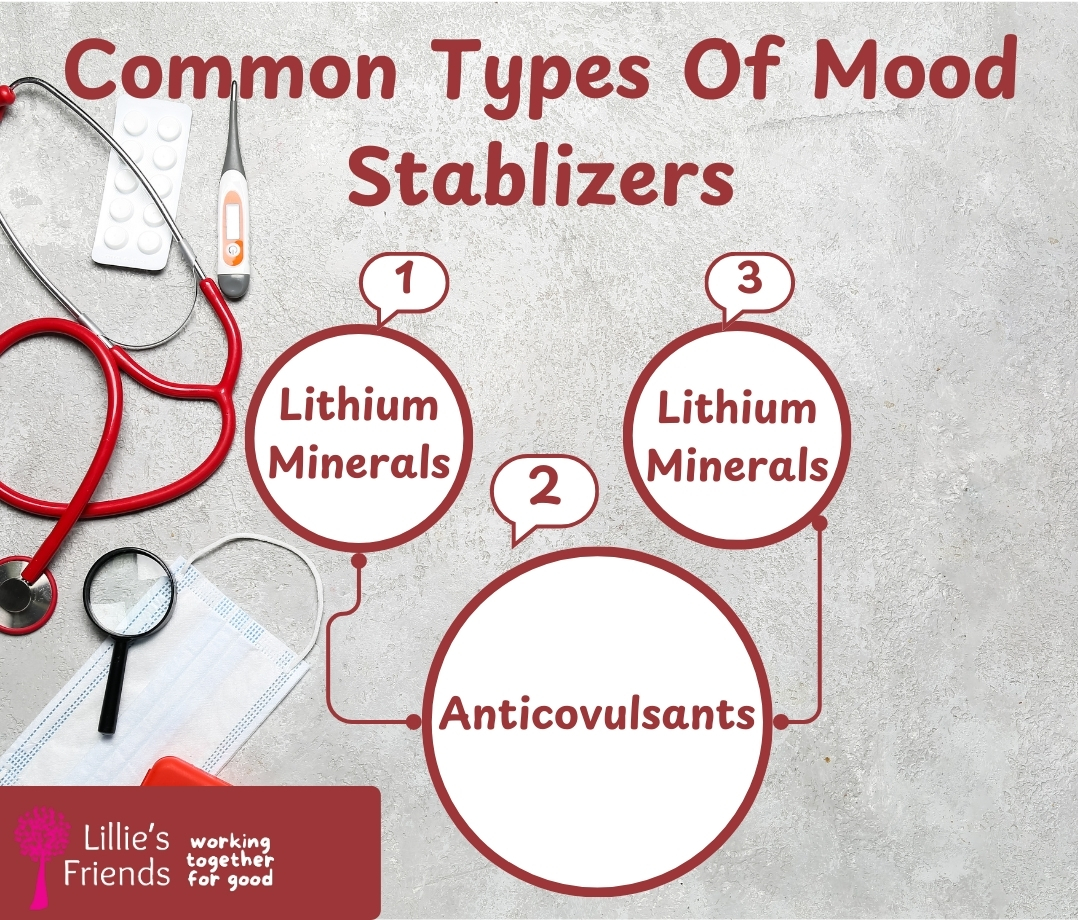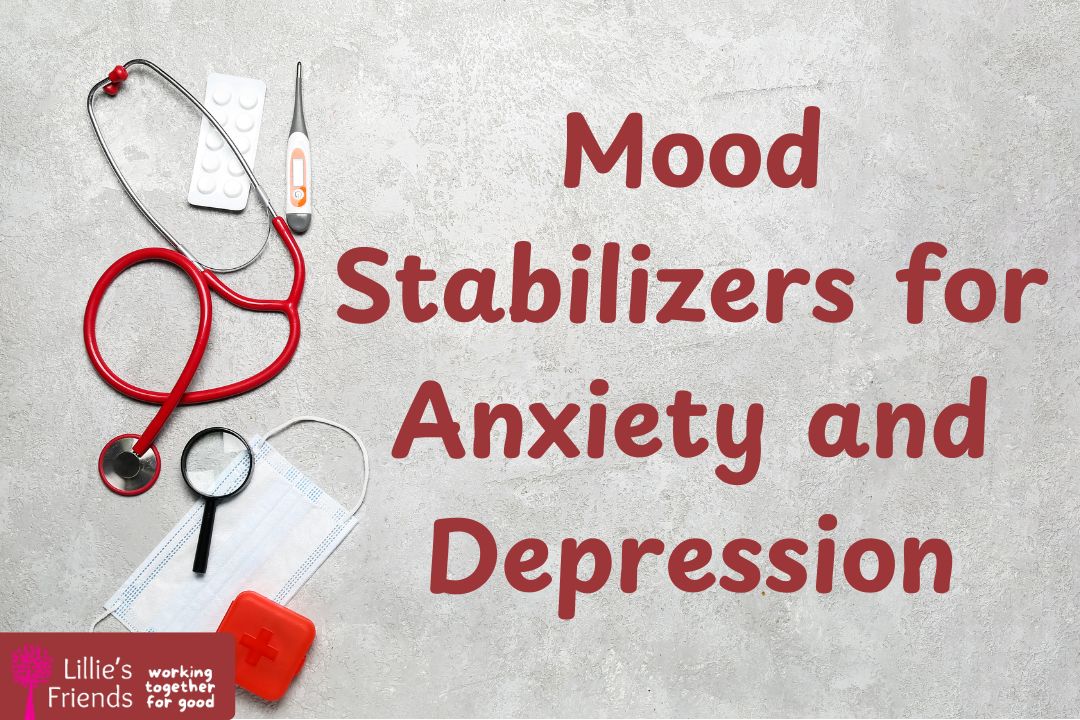A class of drugs known as mood stabilizers is used to treat extreme mood swings and emotional upheaval. Since these medications are designed to balance our emotional states, they efficiently assist in managing depression and anxiety disorders. Lamotrigine, lithium carbonate, and aripiprazole are just a few of the many drugs in this class. The condition being treated, the patient’s present emotional state, and other unique characteristics all influence the choice of the best treatment, the dosage schedule, and other elements.
This page aims to provide a comprehensive list of mood stabilizers for anxiety and depression along with an explanation of each one’s mode of action, possible benefits and downsides, typical side effects, and natural substitutes.
Why Do Mood Stabilizers Exist?
Mood stabilizers ↗ are a class of drugs used mainly to treat mood disorders, the most common of which being bipolar disorder. The severe mood fluctuations that the majority of people with bipolar disorder experience are lessened with the aid of these drugs. They function by controlling neurotransmitters in the brain, specifically norepinephrine, dopamine, and serotonin, which leads to a mood that is more balanced.
How Do Mood Enhancers Help Treat Anxiety and Depression?
Although less frequently used, mood stabilizers can also be used to assist manage the symptoms of anxiety and depression in addition to bipolar illness. This is how they could be useful:
- Depression: Mood stabilizers may be used to treat depression in patients for whom other antidepressant medications are ineffective. They work on the chemistry of the brain, which helps to control mood and lowers the severity of depressive symptoms. Because they contain balanced levels of neurotransmitters including norepinephrine, dopamine, and serotonin, their use enhances emotional stability. A patient has greater energy and experiences a decrease in hopelessness and depression as a result.
- Anxiety: Mood stabilizers may be an option for treating anxiety in patients who are unable to regulate their condition with other approaches. They can help lessen agitation, excessive anxiety, and physical discomfort. By altering brain neurotransmitters, mood stabilizers can provide a calming impact that can lower the intensity of anxiety and increase feelings of calm.
Typical Mood Enhancers
Mood stabilizers primarily consist of three drug classes: antipsychotics, lithium, and anticonvulsants. There are different types of drugs within each of these categories. They are examined in greater depth below.
Minerals containing lithium
One well-known mood stabilizer that is frequently used to treat bipolar disorder is lithium ↗. This material is present in nature and takes on several forms. It functions by controlling neurotransmitters in the brain, which aids in the regulation of mood swings. Its narrow therapeutic range necessitates careful blood level monitoring, yet it works wonders in averting manic episodes.
One way to administer lithium is:
- Lithium citrate (Li-liquid, Priadel).
- Lithium carbonate (Liskonum, Priadel, and Camcolit)
Anticonvulsants
Anticonvulsant ↗ medications were first created to treat seizures, but they have also been found to be effective mood stabilizers. Often recommended anticonvulsants for mood stabilization include:
- Valproic acid (Depakote): Frequently prescribed for bipolar illness with fast cycling.
- Lamotrigine (Lamictal): Mainly used to treat bipolar disorder’s depressive periods.
- Tegretol, or carbamazepine: May alleviate symptoms of depression and manic episodes.
Antidepressants
Antipsychotic medications are occasionally used as mood stabilizers in cases of severe mood disorders. They assist in managing mixed or manic episodes. Antipsychotics that are used to control mood include:
- Olanzapine (Zyprexa): Frequently taken in addition to other drugs to treat bipolar disorder.
- Manic and depressed episodes are treated with quetiapine (Seroquel).
- Aripiprazole, also known as Abilify: May aid in bipolar disorder mood stabilization.

Mood stabilizers to treat depression
One way to treat bipolar sadness could be with one of these mood stabilizers:
- Lithium: Lithium can help people with bipolar illness deal with both manic and depressive episodes. It could also be used to help other drugs work better for people with depression who aren’t responding to them.
- Quetiapine, also known as Seroquel, is an atypical antipsychotic that has been cleared by the FDA ↗ as an extra treatment for major depressive disorder (MDD). It can help people who are depressed feel better, especially when taken with other medicines.
- Lamotrigine (Lamictal): Lamotrigine ↗ has been shown to possibly have antidepressant benefits, even though its main job in bipolar disorder treatment is to stop mood swings. A lot of people think of it as a maintenance therapy to keep people from going back to depressed episodes.
- Aripiprazole (Abilify): Aripiprazole ↗ is an approved additional treatment for MDD that can be added to an antidepressant to make it work better and ease the signs of depression.
- Combination of olanzapine and fluoxetine (Symbyax): This drug blends olanzapine, an antipsychotic, with fluoxetine, an antidepressant. It has been specifically approved ↗ to treat bipolar disorder-related depressive bouts.
How Well Mood Stabilizers Work
Mood stabilizers might help people whose mood swings are caused by anxiety or sadness. These drugs help keep your mood stable by making manic and depressed episodes less severe and happening less often.
Lithium, one of the most common mood stabilizers, ↗ has been shown to help treat anxiety and sadness in people who also have bipolar disorde. Some mood stabilizers and anticonvulsants, like valproate and lamotrigine, can also help with mood problems.
But not all people with sadness and anxiety will be able to use mood stabilizers or get better from them. How helpful the medicine is will depend on the severity of the symptoms, the root causes of the disorders, and how the person responds to the treatment. People may need to take mood stabilizers along with other drugs (like antidepressants) or treatments (like cognitive-behavioral therapy) in order to get the best results.
Mood stabilizers can have side effects.
Some people have side effects when they take mood medicines, but not everyone does. The bad effects can also be different. These are some of the most common side effects of these drugs:
|
Common Side Effects |
Serious Side Effects |
|
|---|---|---|
|
Lithium |
|
|
|
Anticonvulsants |
|
|
|
Atypical antipsychotics |
|
|
Naturally Stabilizing Your Mood
Health care professionals may sometimes suggest natural ways to keep your mood stable. Some people may choose this option if they have minor mental health problems, mood swings that aren’t caused by mental disorders, or who didn’t do well with prescription drugs. But natural supplements that help keep your mind stable can only be used after talking to a doctor. We’ll look at some popular choices below.
St. John’s Wort
The National Institutes of Health ↗ say that St. John’s Wort is one of the most well-known dietary remedies. People who are depressed, anxious, or having trouble sleeping may find this plant medicine helpful. After talking to a doctor, you can buy St. John’s Wort from supplement companies in pill, tea, or liquid extract form.
Rhodiola
Rhodiola rosea, or just “Rhodiola,” is a flowering plant that does best in colder places around the world. In traditional medicine, it has been used to treat emotional and physical exhaustion, stress, and bad moods. New research suggests that Rhodiola may have adaptogenic properties ↗ that could help the body deal with stress. Different chemicals and hormones that control mood are thought to be affected by it.
Healthy Fats (omega-3)
One type of healthy fat that is very important for many body processes is omega-3 fatty acids. These fatty acids are often found in food that is high in fat, like salmon, mackerel, and sardines. It is well known that omega-3s can help keep your brain healthy and may also help reduce inflammation. According to research, getting more omega-3s through food or supplements may help improve your mood and ease the effects of worry and depression ↗ .
5-HTP, or 5-Hydroxytryptophan,
The body makes the amino acid 5-HTP naturally. It is a building block for serotonin, a chemical that helps keep your mood stable and makes you feel good. It is made from tryptophan, which is another amino acid that you can get from foods that are high in protein. People sometimes choose to take 5-HTP tablets to try to raise their serotonin levels and maybe feel less depressed or anxious. But more research needs to be done to see how well these supplements work at treating these diseases.
Mood stabilizers and antidepressants are not the same thing.
Antidepressants are often given to people who have depression or other mood illnesses that are similar to it. They work by changing neurotransmitters in the brain, like serotonin, norepinephrine, and dopamine, which helps lower depression symptoms and improve mood.
Mood stabilizers are also often used to treat diseases that affect mood. People with bipolar disorder are sometimes given antidepressants and mood stabilizers, but they need to be closely watched to make sure they don’t start having manic moments.
|
Mood stabilizers |
Antidepressants |
|
|---|---|---|
|
Examples |
Lithium, Valproate, Lamotrigine |
SSRIs, SNRIs, Tricyclics, MAOIs, etc. |
|
Primary use |
Manage mood swings and bipolar disorder |
Treat depression and related disorders |
|
Onset of action |
1-2 weeks for initial effects, 4-6 weeks for significant effects |
2-3 weeks for initial effects, 6-8 weeks for significant improvement |
|
Association with mania |
Often used to prevent manic episodes |
Can trigger manic episodes in bipolar depression |
|
Monitoring |
Blood tests and regular check-ins |
Regular follow-ups for assessing effectiveness |
Last Words
Mood-stabilizing drugs for sadness and anxiety need to be carefully thought out based on symptoms, treatment history, other conditions that may be present, and possible side effects. A trained medical professional will look at all the information and pick the best medicine for you.
FAQs
How do mood stabilizers make you feel?
Mood stabilizers are drugs that try to keep your mood stable. This means that they can help people with bipolar disorder, depression, and anxiety illnesses who have mood swings. They lower the chance of having manic or depressed episodes, lessen mood swings, and promote a calm emotional state as a result.
Do mood stabilizers help with anxiety?
Most of the time, mood stabilizers are not recommended for anxiety, but they might help with it. To treat nervousness, people often take drugs like SSRIs and benzodiazepines. Tell your doctor everything they need to know about your symptoms and health background so they can choose the best medicine for you.
What mental disorders need mood stabilizers?
Mood stabilizers are mostly given to people with bipolar disorder, a condition marked by mood swings between depression and mania. On the other hand, they can help people with schizoaffective disorder, sadness, and anxiety.
What medication is used for anxiety and mood swings?
A lot of the time, medicines like SSRIs (like sertraline) are prescribed to people who have anxiety and mood swings. It is very important to talk to a doctor so that they can give you personalized advice based on your symptoms.











